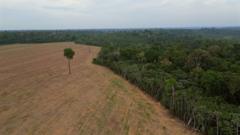Is Brazil's Amazon Rainforest Facing New Threats to Its Protection?

Published: 2025-11-17 02:00:18 | Category: technology
The Amazon rainforest faces a potential resurgence in deforestation as Brazilian farming interests push to overturn the Amazon Soy Moratorium, a crucial ban on soya produced on land cleared after 2008. This moratorium has been instrumental in reducing deforestation rates and is supported by numerous UK food companies that rely on sustainable soy supplies. The outcome of this debate could have significant implications for the rainforest's ecosystem and global climate, making it essential for UK audiences to understand the stakes involved.
Last updated: 02 October 2023 (BST)
What’s happening now
The Amazon rainforest is at a critical juncture as powerful agricultural lobbies in Brazil are advocating for the lifting of the Amazon Soy Moratorium. This longstanding ban prohibits the sale of soya cultivated on land deforested after 2008 and has been pivotal in curbing deforestation rates. As discussions intensify at the COP30 UN climate conference, the implications for both the rainforest and global food supply chains have come under scrutiny. Critics argue that the moratorium constitutes anti-competitive practices, while environmentalists warn that its repeal could spark widespread land grabbing, exacerbating the ongoing climate crisis.
Key takeaways
- The Amazon Soy Moratorium has successfully reduced deforestation since its implementation in 2006.
- Brazilian farming interests, supported by politicians, are pushing to lift the ban, citing economic growth.
- Major UK food companies advocate for the continuation of the moratorium to ensure sustainable soy sourcing.
Timeline: how we got here
Understanding the context of the Amazon Soy Moratorium involves several critical milestones:
- 2006: The Amazon Soy Moratorium is initiated, prohibiting the sale of soya from newly deforested land.
- 2012: Deforestation rates in the Amazon hit an historic low due to the moratorium.
- 2018-2022: Under President Jair Bolsonaro, deforestation rates surged as economic development initiatives conflicted with environmental protections.
- 2023: As the COP30 UN climate conference unfolds, calls to lift the moratorium gain traction amidst conflicting political opinions in Brazil.
What’s new vs what’s known
New today/this week
Recent discussions at COP30 have highlighted the growing divide within Brazil regarding the Amazon Soy Moratorium, with some legislators calling for the Supreme Court to investigate the ban’s implications for fair competition. This has raised concerns among environmental groups about the potential for increased deforestation.
What was already established
The Amazon Soy Moratorium has been recognised as a successful environmental initiative, significantly reducing deforestation rates since its inception. It has garnered support from numerous UK food corporations that rely on sustainably sourced soya for animal feed, thus maintaining a vested interest in the continuation of the ban.
Impact for the UK
Consumers and households
The potential lifting of the Amazon Soy Moratorium could have significant ramifications for UK consumers, particularly in terms of food prices and sustainability. With approximately 10% of the soya used in UK animal feeds sourced from the Amazon, increased deforestation risks could lead to supply chain disruptions and price hikes.
Businesses and jobs
The agriculture sector in the UK, including major retailers and food producers, could face reputational risks if their supply chains are linked to increased deforestation. Companies like Tesco and Sainsbury's, which are part of the UK Soy Manifesto, may need to reassess their sourcing strategies to ensure compliance with sustainability commitments.
Policy and regulation
As the debate around the moratorium intensifies, UK policymakers may need to consider how best to support sustainable sourcing practices. This could involve legislative measures aimed at ensuring that UK supply chains remain free from products linked to deforestation, alongside potential trade implications with Brazil.
Numbers that matter
- 60%: The proportion of UK soy imports represented by members of the UK Soy Manifesto.
- 70%: Public support for government action to eliminate illegal deforestation from UK supply chains, according to a World Wildlife Fund survey.
- 10%: The estimated amount of soya in the UK sourced from the Brazilian Amazon.
Definitions and jargon buster
- Amazons Soy Moratorium: A voluntary agreement prohibiting the sale of soya produced on land deforested after 2008.
- Deforestation: The clearing of forested land for non-forest uses, such as agriculture.
- COP30: The 30th Conference of the Parties to the UN Framework Convention on Climate Change, focusing on climate action and negotiations.
How to think about the next steps
Near term (0–4 weeks)
As discussions at COP30 continue, stakeholders will need to monitor the outcomes of the Brazilian Supreme Court's deliberations regarding the moratorium. This could set the stage for immediate policy shifts or reinforce existing protections.
Medium term (1–6 months)
The impact of any changes to the moratorium on deforestation rates and UK supply chains will require close observation. UK businesses may need to adapt their sourcing strategies in response to evolving regulations and market dynamics.
Signals to watch
- Decisions from the Brazilian Supreme Court regarding the moratorium.
- Public statements from major UK food companies and their sourcing commitments.
- Changes in deforestation rates reported by Brazilian environmental agencies.
Practical guidance
Do
- Stay informed about the developments surrounding the Amazon Soy Moratorium.
- Support sustainable sourcing practices within your purchasing decisions.
- Engage with organisations advocating for environmental protection and sustainable agriculture.
Don’t
- Ignore the potential implications of deforestation on climate change and sustainability.
- Assume that the lifting of the moratorium will have no impact on consumer prices.
- Overlook the importance of advocacy in shaping environmental policies.
Checklist
- Check the sourcing policies of brands you purchase from.
- Stay updated on COP30 outcomes and their implications for the Amazon.
- Consider the environmental impact of your dietary choices.
Risks, caveats, and uncertainties
The debate surrounding the Amazon Soy Moratorium is fraught with uncertainties. The Brazilian government is divided, and the implications of lifting the ban remain unclear. While proponents argue that the moratorium stifles economic growth, opponents warn that dismantling it could lead to catastrophic environmental damage. The situation is fluid, and ongoing political dynamics in Brazil could further complicate matters.
Bottom line
The future of the Amazon rainforest hangs in the balance as agricultural interests in Brazil push to lift the Amazon Soy Moratorium. The implications for the global environment and UK supply chains are profound, making it critical for stakeholders to advocate for sustainable practices and remain vigilant in monitoring developments.
FAQs
What is the Amazon Soy Moratorium?
The Amazon Soy Moratorium is a voluntary agreement that prohibits the sale of soya cultivated on land deforested after 2008, aimed at curbing deforestation in the Amazon rainforest.
How does the moratorium affect the UK?
The moratorium is crucial for UK food companies that rely on sustainably sourced soya for animal feed, ensuring that their supply chains remain free from deforestation.
What are the potential consequences of lifting the moratorium?
Lifting the moratorium could lead to increased deforestation, threatening the Amazon's ecosystem and contributing to climate change, with significant implications for global weather patterns.



